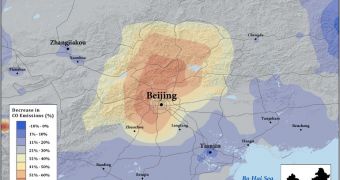Shortly before the 2008 Summer Olympics began in Beijing, Chinese authorities decided to impose a series of severe traffic restrictions for residents. Their purpose was to clear the city's infamous smog from the sky, but they succeeded better than they had expected, a team of American researchers suggests.
According to the conclusions of a new research effort, which included scientists at the NASA Jet Propulsion Laboratory (JPL), in Pasadena, California, it would appear that this type of restrictions can significantly reduce the pace of climate change.
Widespread changes in transportation patterns therefore represent a simple method of reducing the influence of global warming and climate change on the environment. This is in tune with what climatologists have been saying for decades.
Personal cars contribute significantly to the average amount of greenhouse gases we put into the atmosphere every year. Speaking from a resource standpoint, it's entirely unfeasible to reserve two tons of gas-guzzling metal (plus associated manufacturing energy requirements) for each individual.
The investigation was led by experts with the US National Center for Atmospheric Research (NCAR), in Boulder, Colorado. They say that the restrictions the Chinese imposed reduced GHG emissions by between 24,000 and 96,000 metric tons during the Olympics.
The goal of climate scientists is to promote a conservation agenda where global temperature increase is kept below 3.6 degrees Fahrenheit (2 degrees Celsius) by 2100. The reduction recorded in Beijing in 2008 represents a quarter of one percent of what is needed at the global level to achieve this.
“The Beijing Olympics allowed us to actually measure what happens when people drive much less, and it turns out that it makes quite a substantial difference to our climate,” NCAR investigator Helen Worden explains. She was the lead author of the new study.
“People may think their choice of how to commute to work doesn't make a difference, whether driving their cars or riding their bikes. But on a large scale, it really does,” the investigator says.
Most of the data used in this study come from the NCAR/University of Toronto Measurements of Pollution in the Troposphere (MOPITT) instrument aboard the NASA Terra satellite
Details of the research effort were published in the latest issue of the American Geophysical Union's (AGU) journal Geophysical Research Letters. Experts from University of Iowa, the University of Tsinghua, and Argonne National Laboratory were also part of the study.

 14 DAY TRIAL //
14 DAY TRIAL //